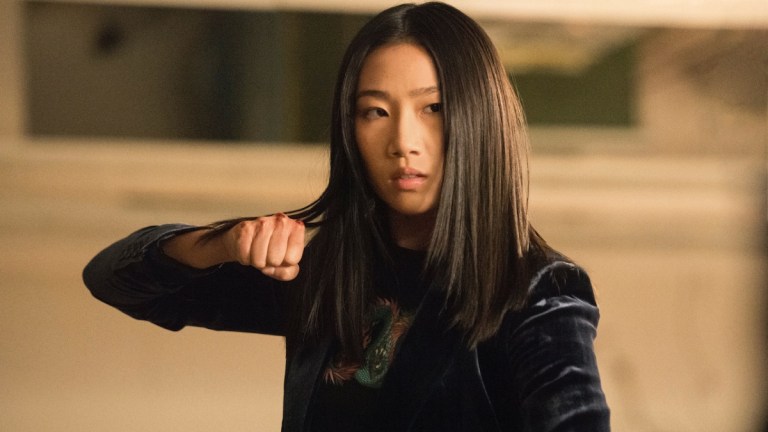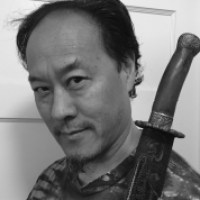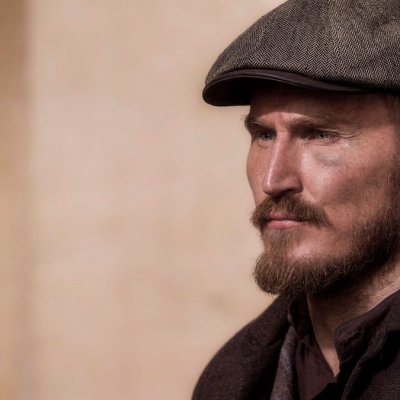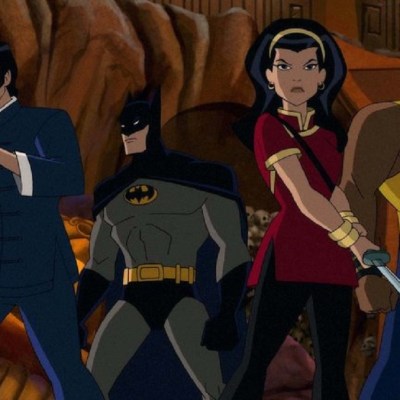Kung Fu: Inside The History of a Martial Arts Classic
The CW takes on the iconic Kung Fu franchise with some new twists on an expansive canon.

It’s been a long journey for The CW to snatch that Kung Fu pebble from the master’s (Warner Bros.) hand, but the new reboot of Kung Fu could not have come at a better time.
Issues of diversity and representation have been at the forefront of our cultural conversations for years now. The rise in Asian hate crimes – nearly a 150% increase in 2020 – has made #StopAsianHate a frequent trending topic on social media. For The CW to launch a show with a Chinese leading actress and a largely Asian cast right now makes a bold statement for inclusivity that lives up to the network’s longstanding slogan “Dare to Defy.”
What’s more, Kung Fu is promoting itself as an Asian family drama which could fill a newly opened gap. Two wildly successful Asian family sitcoms just went off the air – ABC’s Fresh Off the Boat ended its six-season run in 2020 and Kim’s Convenience announced that their final episode after a five-season run will be April 13, 2021 (In the wake of Kim’s Convenience, CBC is launching a spinoff series, Strays, following the character of Shannon Ross, the only white actor credited in show’s opening). This leaves the door wide open for Kung Fu to capture fans of Asian family dramas. Plus it’s The CW, a network that thrives on soap opera-esque dramas.
CW’s reboot is a complete reimagining of Kung Fu, but what of the legacy of the original franchise? Will this new version bring honor to the Kwai Chang Caine a.k.a. Grasshopper? The original Kung Fu series was groundbreaking in its own way. The show garnered critical acclaim including three Primetime Emmys and two Golden Globe nominations. Even though David Carradine’s Kwai Chang Caine would be called out for whitewashing today, with its heavy reliance on Daoist philosophy, Kung Fu provided many Americans with their first taste of many aspects of Chinese culture, especially Shaolin martial arts. It also had the largest Asian supporting cast of any show for decades to come.
The Shaolin Temple Days
When the original Kung Fu premiered in 1972, it was the right time too. The pilot was such a big hit that the network decided to show it again (remember this was long before the invention of VHS – back then your only chance to see a show was to watch it when it was broadcast). However, the second showing was preempted by President Richard Nixon shaking hands with Chairman Mao Zedong. China was opening its bamboo curtain to America at the same time Kung Fu was telecast.
Kung Fu ran for only three seasons on ABC and yet it holds a special place in the hearts of its long standing fans. Kwai Chang Caine was a barefoot half-Asian mendicant monk from the Shaolin Temple who travelled the old west in search of his long-lost half-brother, Danny Caine (Tim McIntire). Caine was a wanted man because he took revenge. He killed the Emperor’s nephew who killed his beloved blind master, Master Po (Keye Luke). Beyond casting almost every Asian actor in the business back then, Kung Fu had an astonishing list of guest stars like Gary Busey, Jodie Foster, Harrison Ford, William Shatner, and many others.
The Chinese Connection: Bruce Lee Vs. Kwai Chang Caine
For decades, it was rumored that Kung Fu was ripped off from martial arts legend Bruce Lee. Lee had written a treatment that was remarkably similar – a story of Chinese immigrant martial arts master who landed in America during the Wild West era. However, in the definitive biography Bruce Lee: A Life, biographer Matthew Polly uncovered substantial evidence that Warner Brothers already had Kung Fu in development prior to Lee’s pitch. Nevertheless, Lee’s daughter, Shannon Lee, claims that her father auditioned for the part of Caine and was rejected because, ironically, he was Chinese. She went on to develop her father’s treatment into Cinemax’s Warrior (another recent show with a predominantly Asian cast that was cancelled last year).
After the original show ended, Carradine returned to the iconic role of Caine several times. In 1986, Kung Fu: The Movie aired on ABC, reuniting Carradine with Keye Luke and introducing Caine’s estranged son Chung Wang. Even more ironic, Chung Wang was played by none other than Bruce Lee’s son, Brandon Lee.
Kung Fu: The Movie was a steppingstone towards a spinoff series attempt, Kung Fu: The Next Generation, with Brandon Lee playing Johnny Caine. Carradine was not involved in this series. Set in modern times instead of the Old West, Johnny Caine was the great grandson of Kwai Chang Caine, but not the Kwai Chang Caine of the original series. The TNG Kwai Chang Caine was named for his great-grandfather – Carradine’s original character – and played by David Darlow. Brandon Lee was cast as both Kwai Chang Caine’s son and his great great great great grandson. Kung Fu: The Next Generation was not picked up. It was only telecast on an unusual short-lived TV showcase called CBS Summer Playhouse, which ran failed pilots every week. Six years later, Brandon Lee died in a tragic on set accident while filming The Crow.
Twenty years after the original series, David Carradine reprised the role of Kwai Chang Caine, or rather the grandson of Kwai Chang Caine, also named Kwai Chang Caine (not the father of the TNG Kwai Chang Caine because the failure of the pilot removed it from canon). That was the first real reboot of the series – Kung Fu: The Legend Continues. Set in modern times again, Caine was paired with a new son, Detective Peter Caine (Chris Potter). The series ran for four seasons, logging twenty-four more episodes than the original.
After that, Carradine never returned to Caine. He went on to promote martial arts with his book, Spirit of Shaolin, which he wrote in 1991, and some instructional Kung Fu videos that he made in the mid-90s. Carradine was never able to completely shake being typecast by the iconic role of Caine. Over the course of over 200 roles, a few more Carradine parts echoed Grasshopper. Fans were delighted to see him play the flute as Bill in Tarantino’s Kill Bill films (the flute was Caine’s signature accoutrement). Tarantino also referenced Kung Fu in Pulp Fiction when Jules (Samuel L. Jackson) tells Vincent (John Travolta) that he plans to walk the earth like “Caine in Kung Fu.”
In 2008, Carradine played “Crane”, a martial art monk just like Caine, in Kung Fu Killer, a two-part mini-series for Spike TV. Carradine claimed that the role was based on an actual historical figure, which he alleges is how the production worked around Warner Bros.’ copyright on Caine. But Carradine was never able to provide the name of that historical figure. He believed that Crane and Caine were ‘diametrically opposed’ but aside from being more violent (in one fight, Crane knocks an opponent so hard that his spine graphically bursts out of his back) viewers are hard pressed to separate them. The series was slated to have three more installments, but those never happened.
The Barefoot Journey to The CW
Kwai Chang Caine had to walk a lot of rice paper before the character could become this new incarnation of Nicky Shen (Olivia Liang) for CW’s reimagining of the franchise. The first major talk of reboot was back in 2011 (on Halloween no less). Bill Paxton (Aliens, Predator 2) was in talks to direct a screen adaptation. John McLaughlin (Black Swan, The Patriot) was tapped to write the script. The production was from Legendary Entertainment and plans were being made to shoot in China. Paxton said they had intended to follow the original story more or less – Caine ventures across the American West of the 1870s in search of his birth father instead of his half-brother. Paxton claimed that his new production would enrich the scale and grandeur to the level that the show always deserved. This was to be feature films under Warner Brother’s Chinese cooperative venture, Legendary East. As the project developed, other writers who became associated with the reboot film included Cory Goodman (Priest) and Rich Wilkes (xXx)
In 2014, Baz Luhrmann (Romeo + Juliet, Moulin Rouge!) was in talks to direct Kung Fu for Legendary. If the deal had been signed, Luhrmann planned to rewrite McLaughlin’s script. Paxton died in 2017 but his name had faded from talk of the reboot prior to his passing.
In an unexpected twist, Universal announced that it was opting Kung Fu for a feature length film in early 2020. At the helm is none other than stuntman-turned director David Leitch (John Wick, Deadpool). Leitch has also been attached to a remake of Bruce Lee’s Enter the Dragon (another property with a long history of attempted remakes). However, since the initial announcements, there’s been no information on the further development on either project from Leitch.
On the TV side of things, Fox grabbed Kung Fu in 2017 for a new series. Greg Berlanti (Arrow, The Flash) came on board to produce with Wendy Mericle (Arrow, Desperate Housewives) penning the script. This incarnation was the first mention of changing the gender of the main protagonist. The new lead was to be Lucy Chang, a Shaolin nun. Instead of being set in the Old West, she was to be living in the 1950s. And instead of searching for her half-brother, it was her kidnapped child.
In a successive treatment, Lucy was set in modern times. She was to inherit her father’s Chinatown Kung Fu school, only to discover that it secretly operated as a center to help those in desperate need. Lucy was partnered with a Korean War veteran named J.T. Cullen. The reboot moved to the CW in 2019 with Christina M. Kim (Blindspot, Hawaii Five-0) taking over as writer and producer and Berlanti still attached as a producer. The story is reimagined with Nicky Shen as a young Chinese American woman in contemporary times, who leaves to find herself at a monastery in China, and then returns to her family in America.
In the pilot, there’s no explicit connection given between Nicky and Kwai Chang Caine so far (save for the quick appearance of a grasshopper). Kung Fu is a complete re-imagining, so all bets are off. But as the season progresses, who knows what references and homages are possible? Reboots thrive on their Easter eggs nowadays, and even if Nicky isn’t within the Caine bloodline, Kung Fu will be well served by tucking some call-backs to the original show.
Will Nicky have to walk rice paper and snatch pebbles from her master’s hand? Will she get those classic Shaolin Dragon and Tiger forearm brands? If she does then perhaps Kung Fu will be the right show for its time while still honoring what came before it.
Kung Fu premieres on the CW on April 7, 2021.


